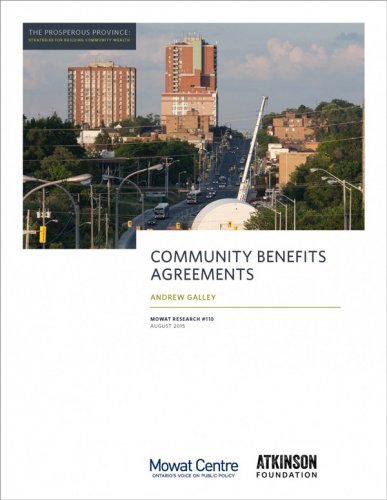This report examines the structure of Community Benefits Agreements and the process for developing them in Ontario. It describes leading examples, the current policy landscape, and related strategic considerations.
Over the next decade, Ontario will invest billions of dollars in infrastructure ranging from transit expansion to new roads and repairs to existing bridges. Cities and towns across the province will also see an influx of public and private capital in land developments designed to meet housing demand and build up underused areas. All of these investments are poised to create substantial new wealth and strengthen the provincial economy.
At the same time, many Ontarians may not share in the prosperity generated by these investments. Income inequality is increasing in the province as it is elsewhere in the Western world. In many larger cities like Toronto, this inequality among individuals is often marked by a growing gap between high- and low-income neighbourhoods. Many jurisdictions are exploring a suite of policy approaches known as “community wealth building” in response to these trends.
Download Community Benefits Agreements
Community wealth building strategies differ from traditional approaches to poverty reduction by putting a focus on the community in market activities like institutional purchasing or infrastructure construction. They include building community assets, increasing the local capacity for business incubation, and creating decent work as a means to sharing prosperity more broadly and equitably.
Community Benefits Agreements (CBAs) are a strategic tool used in the process of building community wealth. CBAs are negotiated agreements between a private or public development agent and a coalition of community based groups. This coalition may include neighbourhood representatives, single-issue advocates, labour unions, social service agencies, religious congregations, faith-based groups and others. Together, they give a voice to people in infrastructure planning and land development processes – especially those indviduals who have been historically excluded or marginalized from these processes and decisions that affect them.
Table of contents
Introduction
Definition, Process, and Players
Community Benefits Agreements in Action
Ontario’s Policy Landscape for Community Benefits Agreements
Insights from Experience
Continuing the Conversation
Format
Source





